Celebrating the passion, dedication and personal stories of Social Ecology faculty, staff, students, alumni and benefactors, “The Dean Asks…” is a feature in which Interim Dean Valerie Jenness interviews people inspired by the pursuit of excellence and encourages participation in interdisciplinary education to solve complex societal problems. Over the next year, please check back to read or listen to additional installments. View Archive
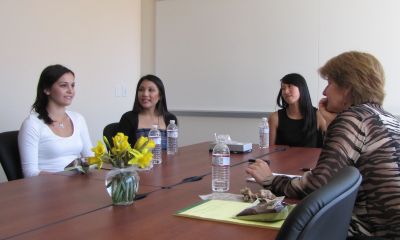
As a public research university, the School of Social Ecology continues to serve society by offering an education that blends rigorous academics with sustained community work and, in so doing, produces well-educated citizens capable of addressing society’s complex problems. The Dean’s Award for Community Engagement builds on this strength and legacy by recognizing those who exemplify this commitment. Interim Dean, Valerie Jenness, met with this year’s recipients, Nicole Goodman, Elizabeth Landeros, and Lydie Loth to discuss their experiences as Social Ecology students and their passion for community service.
Val: Let’s have each of you describe the community work that you are involved in. Elizabeth, can you please start?
Elizabeth: My involvement in the civic engagement minor exposed me to the non-profit organization Share Our Selves. I started volunteering as part of a service learning requirement, where I would volunteer but also would reflect on my experiences there and how it changed my view of the world and the community. Since this class I have continued volunteering there once a week and I volunteer in the food service line packing supplemental grocery bags for people in need and low income families. So I’ve really been exposed to a lot of different types of people that I didn’t know lived in Orange County when I first moved here. I thought Orange County was a rich community and there wasn’t the need I saw growing up in Los Angeles. I have learned that there are people like this everywhere and hard times fall on everybody. It really put things in perspective for me that everything could be going great and then one day you need service, you need help from the community, and if these social services weren’t there, what would these people do? They wouldn’t be able to feed their families. At least once a week there is one or two people that come in and it is their first time for food and they are scared. It brings humanity to this experience.
Val: Elizabeth, what have been some of the moments of enlightenment or the challenges that you have had while doing this volunteer work?
Elizabeth: The biggest challenges are the days I walk in to the food department and there is not very much food to give out. During the holidays, there was tons of food because everybody has their food drives and people are more gracious and giving during the holidays. But I think people fail to realize that these people need food all year round. So when February comes around and there are no more food drives and Costco has not dropped off their donation delivery, we are just handing out cereal and the bare minimums. As a volunteer, you do not feel good about the grocery bag you are giving the needy families. I think that is one of the biggest challenges.
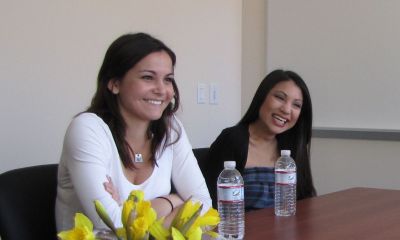 Val: Nicole, could you describe some of the volunteer work you are doing under the rubric of civic engagement?
Val: Nicole, could you describe some of the volunteer work you are doing under the rubric of civic engagement?
Nicole: Recently, I have been spending a lot of time at Orange County Rescue Mission in Tustin, specifically in their homeless rehabilitation center. They are not just an emergency shelter. Instead, they recognize the need of the homeless community to not only get immediate service, but also they train people on how to re-establish their lives. When I first started, I packed food boxes and did not really have direct interaction with the residents. Then, I approached the director and I asked her how I could really make a difference. So, she put me into the child development center with teenage moms to be a “role model.” This made me a bit uncomfortable and I felt under-qualified because I do not have a child. So, instead of telling them what to do I tried to make relationships with the women and encouraged them and pointed out their strengths. Often these women feel like victims, but I try to show them that they are not. So far, it has really turned a few of the women around. I often ask myself why we have so many community services, but nothing is changing. I think it is because we need to get to the core of the problem, which is often the psychological well-being of a person. We need to change the way they view the world.
Val: Nicole, what was the most challenging part of your volunteer work?
Nicole: Getting these women at the child development center to trust me enough. I wanted them to see me as one of them, rather than an outsider who doesn’t know what they are going through. Teen moms have a stigma attached to them and I try to show them that they are valued as a person. In fact, I have actually developed some friendships with the women at the center.
Val: Lydie, can you give us a quick overview of the volunteer work you do?
Lydie: I started a student organization last year called the Women in Criminal Justice Network with the help of Professor Schuele, who had a class called Gender and Social Control. In the class, students had an opportunity to visit a women’s prison in Corona. Hearing about the issues that the women in prison were facing, inspired me to start this club to create awareness and educate other students so that if any policies or legislation come up regarding this issue, students can vote or talk to their legislators. We had our first awareness event during the winter quarter and asked students to write Valentine’s Day cards to women in prison. We were able to deliver over 500 cards signed by UCI students to the prison. Many students signing cards mentioned how they had never thought about women in prison, which I think is due to the social emphasis and research done on men in prison. Our second event this year was a benefit concert to raise $4,000 for the Get on the Bus program, which provides children the opportunity to visit their incarcerated parents on Mother’s and Father’s Day. With the help of Vice Chancellor Gomez, we raised just under $3,000 through the concert. We are still trying to reach our goal of $4,000 by asking for sponsorships and reaching out to our friends and family.
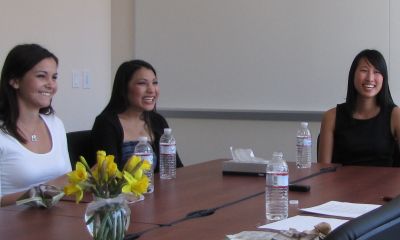 Val: What led you to become a volunteer? What inspired—or inspires your volunteer service?
Val: What led you to become a volunteer? What inspired—or inspires your volunteer service?
Elizabeth: I got my first exposure to volunteering when I was in Girl Scouts. We did countless hours of volunteering for our community. We had strong mothers that did not just have us selling cookies. We visited retirement homes, worked in soup kitchens and did activities outdoors. Girl Scouts is where I got my foundation and a sense of giving back. When I started volunteering at Share Our Selves, I got hooked and it was hard for me to walk away because I saw how much work there was to be done. I feel fortunate in my life because I am young, healthy and have the opportunity to get an education. So, I feel that I have so much to give and there is always time to volunteer, even in my busy schedule. Volunteering humbles you and makes you realize the issues that are surrounding the community.
Nicole: I have a very similar view as Elizabeth. I have been volunteering since I was ten years old, which I credit to my mom who has really empowered me and my family. She taught us to never to be a victim and use our circumstances as an excuse. She also taught me to always be grateful. I started volunteering for St. Joseph Hospital in their various programs like in their convalescent homes. Also, I have always had the view that since we live in the U.S., which makes us among the ten percent richest people in the world, we are incredibly blessed and it is our civic duty to give back. I feel everything is interconnected and if you have something extra, you should give it to others.
Lydie: For me, my story is kind of the opposite of Elizabeth and Nicole’s stories. My mom is a really hard worker and she moved us here from France on her own and without speaking English. Her goal for me is to get a good education, which will then lead to a good career and good life. Community service is not something she really encouraged me to do. But for me, I could not just do that. I feel so privileged because my mom had worked so hard to move me here, why wouldn’t I want to give back to others in need? So, I started my volunteering in high school. I want to advocate for people who don’t have a voice or think that they can’t make it, because at times in my life, I felt that I couldn’t be successful. I am now the Social Ecology representative for ASUCI, president of the Women in Criminal Justice Network, and in the UCI recycling club. I love being an advocate for others.
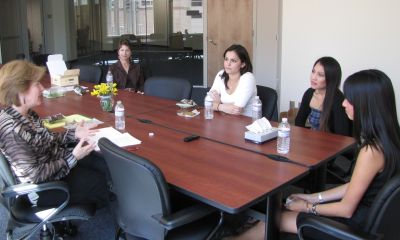 Val: Each of you have said in different ways that community engagement is “just me” and is how you were raised or feel. How do we, in the School of Social Ecology or in our community, cultivate this sense of volunteerism in other people?
Val: Each of you have said in different ways that community engagement is “just me” and is how you were raised or feel. How do we, in the School of Social Ecology or in our community, cultivate this sense of volunteerism in other people?
Lydie: I think each person has to find something that they are passionate about, which is different for everyone. Many students do not want to volunteer unless they get credit hours or acknowledged in some way. But if students would dedicate themselves to something they are passionate about, they will realize that volunteering to help others will make them feel good. That can be selfish, in a way, but it is a different kind of selfish.
Val: So maybe our job, as a School, is to structure ways for students to have a greater chance of finding their passion, perhaps through field study and other opportunities.
Lydie: Yes, I agree. For example, I am currently taking Professor Maxson’s gang class and she is making the class so interesting! She has guest speakers come and it has motivated me even more to go to graduate school and eventually work in the incarceration system. Little things like this help students discover their passion.
Nicole: I really love this question because this is the main frustration I have always encountered with my relationships with people who do not have a sense of volunteerism. But here at UCI, I have learned to not make someone feel guilty for not volunteering because most students were raised to think that their GPA is everything and they cannot side step with community work. Like Lydie, I am often on Ring Road promoting Engage UCI, a day of celebration of community collaboration. I am one of the undergraduate representatives on the Engage UCI committee and I hope to change the reputation of UCI being a self-involved research institution only. We want UCI to be the liaison for students and the community. I think this can be accomplished by incorporating community service into the university curriculum, not just the Social Ecology curriculum like it is now with field study. The university is founded on a three legged stool, how are we supposed to operate if only two of our legs work? I learned in Professor Day’s class that originally in a university, professors were not to just give knowledge to students, but to teach them how to be moral citizens. Over time the university started research as a tool to advance the community. But now, things have switched and I see research being used to publish in academic journals for self gain of the professor.
Elizabeth: I agree with Nicole, volunteering should be required at a university and students should given credit for their time. I think one or two quarters of community engagement should be required because students would be exposed to our community needs and it might open up a whole other world for them that they had no idea was so valuable.
Val: Do you think it would have been the same experience for you if you were paid by either money or in credits?
Elizabeth: Yes, I think it would still work. I started volunteering for credit at Share Our Selves, but continued to volunteer after my class was over. When you are in a higher education institution your time is valuable and you need compensation for what you do, otherwise you are not able to do everything. It will create a pathway for those people who do not start volunteering on their own.
Lydie: I have learned that if I have free food, students will come to my event and then learn about it as well. It is a hidden incentive. Why is Disneyland offering free tickets for volunteering right now? That is the same thing. I think if you do provide the incentive for students who are not as likely to volunteer on their own, you then might be able to get them engaged.
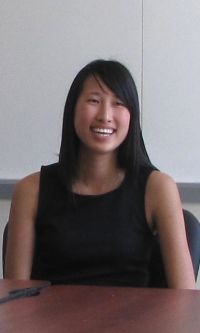 Val: Let me ask you to respond to a quote: It was Winston Churchill who first wrote “We make a living by what we get, but we make a life by what we give.” How do these words apply to our debt to society?
Val: Let me ask you to respond to a quote: It was Winston Churchill who first wrote “We make a living by what we get, but we make a life by what we give.” How do these words apply to our debt to society?
Nicole: I think it says a lot about the U.S.’s emphasis on productivity and accomplishment, which define who you are. I forgot who said the quote “we are human beings, not human doings.” You need to develop who you are because when you look back at your life, how do you want people to remember you? It is really getting out of the mindset that the more you achieve the better person you are, which is not true. Instead, achievement should go hand in hand with community engagement. At a university, it is important to use our achievements or research to perpetuate change and social justice to make a better world.
Elizabeth: I too, do not believe that we are defined by our careers or what we do for a living. I think it is what you do as a person in your community and what you give back to others. When you have a lot, you should give a lot. I am going to pursue a career that will help me broaden my scope of impact in the world. I am looking for a career in community development or public administration, where I can help more people because of my achieved status.
Lydie: By just watching and talking to my friends, their actions are a lot about building up their resume. It’s about what you do to get what you want. A lot of my friends are in organizations or they are doing research just because that is what graduate schools are looking for. Then, in graduate school, you do research because that is what specific professions are looking for. They are no longer doing things for themselves based on what they are passionate about. But I think, like the quote says, life is more about giving back a part of yourself to the community. Just taking or receiving is so selfish. You need to be able to say, this is what I did, this is how I changed a little part of a community, or this is how I changed someone’s viewpoint on this issue.
Val: Share with me your vision for you future. How do you imagine yourselves in five or ten years, and how will your time and energy be spent?
Lydie: After I graduate this Spring, I am going to graduate school for my master’s in Criminal Justice. In between that period after graduate school and applying to the FBI, I want to work in public policy work. I talked to Connie Rice, who is one of the speakers in my gangs class and she is doing some gang policy work, so I want to work in her office. In the FBI, I hope to be promoted to an administrator so I can work in the incarceration system on their recidivism rate, focusing more on rehabilitation rather than just punishment.
Nicole: For me, I have changed my mindset since starting college. I use to be so future oriented that it almost deterred me from achieving anything. Once I stopped thinking so hard about it, amazing things started happening. Right now, I am looking into a Master’s International program, which combines a Master’s program with international service via Peace Corps. I like the idea of being a global citizen. In the immediate future, I hope to make an impact on UCI students and get our university’s reputation changed to a more community engaged campus. When I say “community engagement” to people, most do not know what I am talking about. This is very sad to me and I hope I can make some movement to getting students more involved and incorporating community engagement into the curriculum. I know it is idealistic, but it needs to be done and it is better for the university as a whole.
Elizabeth: I would like to go to graduate school and then get into public administration. I would like to study planning and community development because I think they go hand in hand. If you do not have infrastructure for transportation or land use development and you are not working on the places where people live, then it reflects in the types of communities that are created. I want to be involved in this because I think that bettering where people live betters their lives. This summer I will be a part of the UCDC program, so I am hoping to get some exposure in policy and planning. Then I will work for two years to really narrow down my focus and see where I would be most effective.